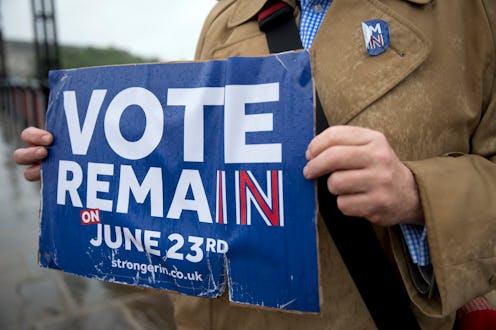News
Here's Exactly What "Brexit" Means
You've likely seen headline after headline featuring the term "Brexit." If you're not sure what it is, you're not alone. Comedian John Oliver thinks the term sounds like the name of a bad granola bar, but it's actually a lot more serious than that: Brexit is a hot topic of debate in Britain, and the results of the referendum on it could have substantial economic and social consequences. So, what does Brexit mean?
Brexit is a word smush (or "portmanteau," if you want to be fancy) of "Britain" and "exit." Basically, Britain is considering exiting the European Union. British citizens will decide on June 23 whether or not to make this move in a referendum vote, The New York Times reported. The European Union consists of 28 countries currently and makes it easier for goods to be bought and sold, and for people to travel from one country to another within it. In order to make that possible, member states need to give up some of their sovereign policy-making authority, which is conducted on the level of the EU to facilitate trade and travel.
Some Britons are not pleased with the European Union's recent efforts to manage the migrant crisis, reported The New York Times. The EU is working with member states to settle refugees, mostly from Syria and Afghanistan, across the continent. Britain is taking a relatively small share of them, but there is still backlash from some citizens. As Brain Klaas, a fellow in comparative politics at the London School of Economics, put it to the Times, "There's this feeling that we're losing our cultural identity and our national identity, at the same time that there's this influx of people who are willing to work for low wages."
On the other hand, many Britons want to stay a part of the EU. There are, after all, potentially massive economic consequences of withdrawing. Pro Europa, an organization that advocates for Britain's continued membership in the European Union, offers a few key points in this vein. Without the EU, Britain would have to renegotiate trade deals on its own; being part of the massive EU makes trade with Britain more appealing, whereas, on its own, the country is not nearly as attractive a partner.
Also, one of Britain's main trade partners is the European Union, which buys over half the country's exports. Another key economic argument Pro Europa makes is that about 10 percent of British jobs are tied to the European Union's unified market. Immediate economic instability after departure from the EU is the concern driving the "I'm In" movement for many Britons, including Prime Minister David Cameron.
Opposing sides in the Brexit debate are equally represented among the citizenry, if a recent poll is accurate. ABC News reported that the poll found support of and opposition to exiting the EU both at 44 percent ahead of the referendum vote.
The migrant crisis has sparked a desire for greater sovereignty among some British citizens, while others see the economic benefits of EU membership as more important. That, in a nutshell, is Brexit.
